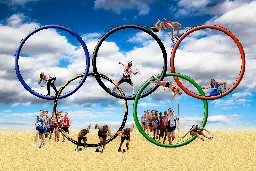I'm not a huge pizza person but paid $30 for a 9 inch from a pizzeria in Chicago a couple of months ago. It was tasty so I didn't mind but it did seem quite a bit higher than the last time I had pizza.
I'd never give Domino's that much for a pizza though, from what I recall their offerings are subpar.
An American family is claiming more than $80,000 from NASA after a small piece of debris fell from space and smashed through the roof of their Florida home, a law firm said Friday.

An American family is claiming more than $80,000 from NASA after a small piece of debris fell from space and smashed through the roof of their Florida home, a law firm said Friday.
The problem of space trash has risen in tandem with increased spatial traffic, and NASA's response could set a precedent for how future claims are handled, law firm Cranfill Sumner said in a statement.
On March 8, an object weighing just 700 grams hit Alejandro Otero's home in Naples, Florida, making a hole in the roof.
NASA later confirmed it was part of a cargo pallet of used batteries that was released from the International Space Station as waste in 2021.
Instead of fully disintegrating before falling to Earth, a section remained intact when it reentered the atmosphere, the US space agency said.
Otero's son was at the house at the moment of impact, according to the law firm, which said that NASA has six months to respond to its claim.
"My clients are seeking adequate compensation to account for the stress and impact that this event had on their lives," said lawyer Mica Nguyen Worthy.
"They are grateful that no one sustained physical injuries from this incident, but a 'near miss' situation such as this could have been catastrophic.
"There could have been serious injury or a fatality."
NASA did not immediately respond to AFP's request for a comment.
Depends on the location and the number of people in your party. Sometimes it does work out cheaper to rent an apartment or even a house instead of several hotel rooms. Kitchen space is always a boon, I'm rarely impressed by overpriced restaurant fare and prefer to cook for myself when possible. It can also be helpful if you're traveling with pets.
Depends on the distro but you are largely right. You can easily use Linux Mint or Ubuntu without being familiar with the cli.
You are not too dumb to learn Linux. If I learned how to use it then you can. Start with with something simple and easy to install such as Linux Mint or Ubuntu and you will inevitably learn more as you go on. If you can read, type, point, click and observe then you have all the skills required to install the aforementioned distros.
That depends on where you live. The Internet Archive is far more accessible than a good library, for much of the global populace.
And my point is that maybe they should have established a market by releasing a cheaper model first.
It can be used over tor, i2p and clearnet.
It is definitely maintained.
You mean they're doing what everyone said they should have done to begin with - release an affordable consumer product that will in turn attract more developers?
Teaching English to non-native speakers will fully open your eyes as to how broken and outright ridiculous the English language is. "To" and "too". "Through" and "threw"....
I've been using a 6 since it's release, it's been solid for me. The 7 is slightly sleeker/smaller but they're almost identical in performance.
America...
Another one...
Sure. That's worked out great for Cuba and countless others who have their elected leaders assassinated by Western powers but please tell me more about this supposed "choice"...
It really wasn't a "choice". Western capitalist interests have spent the past seven decades trying to bully the rest of the world into falling in line with their nefarious aims. And last I checked KFC, McDonald's, Burger King, Dominos' Pizza, Pizza Hut, Kelloggs, et al. were all western interests. I see them in every country I go to, they are a large part of the reason for the global obesity crisis. Last I checked none of them are known for selling traditional Vietnamese, Kenyan or Mongolian cuisine.
Nobody is denying how destructive capitalism is as a whole but only a very dishonest person would deny that it was western capitalists who pushed their diseased way of being onto the rest of the world and not the reverse. The Chinese and Indians are not doing anything that western corporations have not spent the past several hundred years doing.
Western capitalists are dominant globally. They enjoyed a multi decade head start. Yes, all capitalists are bad but western capitalists have been the most destructive.
Thank you western capitalists for polluting our air, water and minds and then making our children sick. We are most grateful.
A minority of countries that opposed a legally binding U.N. tax convention may seek to water it down, experts warn, risking the new convention becoming as “inconsequential as the OECD.”

Wealth and corporate taxes remain a sticking point between countries at the United Nations negotiating the roadmap for a framework convention on tax, which could herald a radical shake-up of the global tax system.
The first round of talks to establish parameters that will guide the creation of the convention — initially opposed by wealthy countries including the United Kingdom, the United States, and some members of the European Union — concluded on May 8.
Some progress was made amid ongoing tensions between higher-income members of the Organisation for Economic Co-operation and Development, or OECD, and African U.N. member states, now backed by a coalition of developing countries known as the G77.
“Both the developed and developing countries agreed easily on environmental taxes but strongly disagreed on taxes for wealth,” said Abdul Chowdhary, a senior program officer for South Centre Tax Initiative, a Geneva-based think tank representing developing countries from Africa, Asia, Latin America and elsewhere.
“The developed world took the view that the reforms to tax the world’s wealth are being addressed already by the OECD and the developing world believes that the OECD has been inadequately addressing the matter and that the U.N., too, should be able to do so,” said Chowdhary.
In November 2023, the U.N. General Assembly voted overwhelmingly to adopt a resolution tabled by Nigeria calling for an inclusive U.N. forum to tackle international tax dodging, corporate tax reform, wealth taxes, environmental taxes, and more.
Such a move would shift power away from the OECD, which has shaped the global tax agenda for decades but has been described by some observers as a “rich countries’ club” that sets international tax policy behind closed doors.
Many countries that voted against a legally binding framework convention — a sort of “global constitution” under which rules, known as protocols, are set — argued for looser terms of reference that experts noted may ultimately weaken the convention.
Disagreements also emerged over the committee’s decision-making mechanism: the developing countries’ bloc favored voting by a simple majority if no consensus emerges, whereas the wealthy countries’ bloc argued for consensus-only decision-making, which could allow a minority of states to wield veto power.
He is scheduled to be arraigned on Thursday.

A Catholic priest allegedly spent $40,000 of church money on Candy Crush and slot machine apps.
A Pennsylvania Catholic priest was accused of stealing $40,000 from a parish and using the money to play games on his phone. According to CBS News, citing a criminal complaint and affidavit of probable cause, Lawrence Kozak allegedly spent over $214,000 on his Apple ID, with just under $44,000 of that amount charged to a credit card associated with the parish.
Authorities claim he racked-up the charges over a three year span, using the some of the cash to play games like Candy Crush Saga, Pokémon Go and virtual slot machines, according to the network.
The network noted that these apps do not award real money for wins in the game, but allow you to spend actual money to play. According to CBS, Kozak described spending money on his slot apps as "powering up" instead of gambling.
Kozak's Amazon account was also reviewed and it was found that he allegedly used the parish card to buy gifts for his goddaughter, which included a chemistry set and an Amazon Fire tablet, per the network.
According to CBS, the parish's business manager noted that it wasn't the first time there was alleged erroneous spending at the church. Per the network, Monsignor Joseph McLoone resigned from St. Joseph Church in 2018 after he was accused and later pleaded guilty to stealing thousands in parish funds to pay for a beach house at the Jersey Shore, pad his salary and send money to men.
An exceptionally rare haze of Saharan dust cloaked Switzerland and southeastern France on Saturday, sparking health warnings as a yellow hue tinged the sky.

An exceptionally rare haze of Saharan dust cloaked Switzerland and southeastern France on Saturday, sparking health warnings as a yellow hue tinged the sky.
The phenomenon, which began in Switzerland on Friday, brings with it "a very clear worsening of sunlight and visibility. Added to that is an increase in concentrations of fine particles", the MeteoSuisse weather service posted on X.
With the dust concentrated at lower than 3,000 meters (around 9,800 feet), air quality was especially affected, with Switzerland's airCHeck monitoring application flagging high levels of pollution in a corridor stretching from the southwest to the northeast.
Calculations estimate that the amount of dust reached around 180,000 tonnes, double the levels recorded during recent similar events, SRF Meteo forecaster Roman Brogli told public radio.
In neighboring France, local authorities in the southeast and south announced that the air pollution threshold was breached on Saturday, with the Herault department asking residents to avoid intense physical effort, particularly those with heart or respiratory problems.
The Sahara desert releases 60 to 200 million tonnes of mineral dust per year. While the largest particles come rapidly back down to earth, the smallest can travel thousands of kilometers.
The sand gives an orange tint to snow and can impact melting processes, notably for glaciers, which are shrinking as average temperatures rise, by reducing the ice's ability to reflect sunlight.
A former Central Valley High school teacher’s “predatory actions” stripped a student of his dreams and significantly harmed him and his family after the teacher had sex with the 17-year-old, the student’s mother told a judge Thursday.

A former Central Valley High school teacher’s “predatory actions” stripped a student of his dreams and significantly harmed him and his family after the teacher had sex with the 17-year-old, the student’s mother told a judge Thursday.
McKenna Kindred, 25, will receive no jail time – recommended by the prosecution and defense – after she pleaded guilty Thursday to amended charges of second-degree sexual misconduct with a minor and communication with a minor for immoral purposes, both gross misdemeanors.
Spokane County Superior Court Judge Dean Chuang sentenced Kindred to two years of probation and $700 in fines and fees. She must register as a sex offender for 10 years.
Students came forward in December 2022 to describe the inappropriate relationship between Kindred and her teacher’s assistant.
The teen’s classmates told school officials he was inappropriately messaging Kindred via Instagram and that he was defensive when they questioned him about the relationship, according to court documents. Kindred also reported to administration she was being harassed by someone on social media, accusing her of a sexual relationship with a student that she denied.
The teen’s mother later told law enforcement her son had a sexual relationship with Kindred, that he’d been to her house alone with her and that the two had been sharing explicit photos over Instagram, court records say. Detectives did not find photographs “that appeared overtly sexual in nature,” documents say. There were messages referencing masturbation.
The teenager was interviewed at his home and admitted he’d begun messaging Kindred in June 2022. He told police he visited Kindred’s house and that they had sex. He also admitted to sharing explicit pictures and videos with Kindred, according to court records.
Central Valley School District said last year Kindred had resigned.
The student’s mother told Chuang that Kindred’s actions were an “abuse of power” and that she started to “groom” him when he was 16.
She said her son was unable to finish high school on campus, which affected him socially, emotionally and academically. He also lost some of his youth and missed out on major milestones.
The woman said her son played soccer since he was 18 months old, but Kindred’s criminal actions forced his plans to change.
“A light he used to carry has been dimmed,” she said.
The mother said she agreed to the attorneys’ sentencing recommendations, so the case did not drag out any longer.
And also offer the worst value for money in the developed world.

Homes in England are more cramped than those in New York City, according to new analysis that showed UK property offers the worst value for money in the developed world.
The Resolution Foundation found that the UK has the oldest properties in Europe and English homes have less floorspace than many international peers, notably Germany, France and Japan. With 38 square meters on average per person, London homes are even more cramped than those in New York City.
The findings, which also show UK housing costs are also more expensive relative to general prices than in any OECD country, underscore the scale of the housing crisis in Britain. Many younger Britons are struggling to get a foot on the property ladder due to soaring prices, and the issue is rising up the political agenda ahead of an election expected later this year.
“By looking at housing costs, floorspace and wider issues of quality, we find that the UK’s expensive, cramped and aging housing stock offers the worst value for money of any advanced economy,” said Adam Corlett, principal economist at the Resolution Foundation. “Britain’s housing crisis is decades in the making, with successive governments failing to build enough new homes and modernize our existing stock. That now has to change.”
The Resolution Foundation found that if all UK households were “exposed to the full brunt of the housing market, the UK would devote the highest share of overall spending to housing” to every OECD country except Finland.
Some 38% of UK homes were built before 1946, higher than the level of 29% in France, 24% in Germany, 21% in Italy and 11% in Spain. That means British properties by comparison are poorly insulated and come with higher energy bills.
Of 17 European countries, only four have seen greater percentage outflows of money this year

Money is flowing out of the London equities at a faster pace than ever, despite government efforts to boost the stock market.
According to Investment Association recent figures UK savers took £14 billion out of UK equities last year, the eighth consecutive year of outflows.
New research by SCM Direct for the Evening Standard suggests this situation is getting worse rather than better despite some experts insisting London shares are now so cheap they represent a buying opportunity.
SCM looked at money flowing through Exchange Traded Funds, an increasingly popular tool for both small investors and large institutions.
Of 17 European countries, only four – Austria, Norway, Germany, Holland – have seen greater percentage outflows of money this year. The largest UK equity ETF is the iShares Core FTSE 100 ETF which has a massive £14.8 Bn invested in it – this compares with the largest US Equities ETF worldwide, the SPDR S&P 500 ETF that holds $507 Bn in assets.
Alan Miller of SCM Direct said: “Europe as a whole has seen money coming in not out. This is part of the reason for the abysmal showing of the UK market this year – the FTSE 100 is up just 0.2% vs +10.6% for the Euro Stoxx 50.”
Miller adds: “There are some underlying fundamental reasons for the poor performance of UK equities, the over-representation in the ‘old’ economy i rather than tech, together with the ongoing uncertainties surrounding Brexit and its economic implications. Political instability, including changes in leadership and policy direction, has also contributed to a lack of confidence in UK equities. But this simply does not account for the gulf in performance and valuations between the UK and its peers.”
One problem is that pension funds have just 4% of their assets in UK shares compared to 50% in 1990.
This compares with Australia & Canada, both small markets, being 22% and 9% respectively of their pension funds. In fact, the pension fund that invests on behalf of Britain’s MPs and ministers, has just 1.7% invested in UK-listed companies.
Scientists witnessed a male orca known as Starboard single-handedly kill a juvenile great white shark within minutes last year. They say this hunting behavior could be a sign of a wider shift in the marine ecosystem.

A pair of orcas working in concert have been killing great whites along a stretch of South African coastline since at least 2017, plundering the sharks’ nutrient-rich livers and discarding the rest.
Scientists have been trying to make sense of the hunting approach, which has driven the sharks away from some parts of the coast around Cape Town, and now research has revealed a startling new twist in the behavior that could offer clues on what it might mean for the wider marine ecosystem.
Scientists witnessed one of the hunters, a male orca known as Starboard, single-handedly kill a 2.5-meter (8.2-foot) juvenile white shark within a two-minute time frame last year.
“Over two decades of annual visits to South Africa, I’ve observed the profound impact these killer whales have on the local white shark population. Seeing Starboard carry a white shark’s liver past our vessel is unforgettable,” said Dr. Primo Micarelli, a marine biologist at Italy’s Sharks Studies Centre and the University of Siena who was aboard one of two vessels from which researchers observed the attack.
“Despite my awe for these predators, I’m increasingly concerned about the coastal marine ecology balance,” Micarelli said in a statement.
It’s not unprecedented for orcas, highly intelligent and social animals, to hunt large animals individually. However, it’s the first such occurrence involving what is one of the world’s largest predators — the great white shark — the researchers reported in a study published Friday in the African Journal of Marine Science.
Starboard’s kill is at odds with more widely observed cooperative hunting behavior among orcas, which can surround large prey, such as sea lions, seals and sharks, and use their combined intelligence and strength to attack, said lead author Alison Towner, a doctoral researcher at Rhodes University.
The killer orcas are scaring off great white shark populations, but researchers don’t know where the sharks are relocating. “As they relocate, they might end up overlapping with heavy commercial fisheries,” Towner added.
After a long battle, Paris's beloved bouquinistes will be staying put this summer. The decision, announced on 13 February by the French government, came after considerable public backlash to the police prefecture's original plan to move part of the iconic Seine booksellers elsewhere for the inaugura...

After a long battle, Paris's beloved bouquinistes will be staying put this summer. The decision, announced on 13 February by the French government, came after considerable public backlash to the police prefecture's original plan to move part of the iconic Seine booksellers elsewhere for the inauguration of the Olympics Games on 26 July.
In academia, the debate about the potential positive and negative effects of large-scale sporting events is ongoing. Although these events are often associated with substantial economic losses, the long-term benefits are the main argument in favor of hosting them. These include the development of material and soft infrastructure such as hotels, restaurants or parks. Big games can also help put the host region on the map as an attractive place for sports and cultural events, and inspire a better entrepreneurial climate.
The cost of these benefits, as the Parisians have realized, is steep. Host countries appear to suffer from increased tax burdens, low returns on public investments, high construction costs, and onerous running cost of facilities after the event. Communities can also be blighted by noise, pollution, and damage to the environment, while increased criminal activity and potential conflicts between locals and visitors can take a toll on their quality of life. As a result, in the recent past several major cities, including Rome and Hamburg, withdrew their bids to host the games.
A common feature of the economics of large-scale sporting events is that our expectations of them are more optimistic than what we make of them once they have taken place. Typically, expenditure tends to tip over the original budget, while the revenue-side indicators (such as the number of visitors) are rarely achieved.
When analyzing the effect of hosting large-scale sporting events on tourist visits, it is important to take into consideration both the positive and negative components of the overall effect. While positive effects may be associated with visitors, negative effects may arise when "regular" tourists refuse to visit the location due to the event.
This might be because of overloaded infrastructure, sharp increases in accommodation costs, and inconveniences associated with overcrowding or raucous or/and violent visitors. On top of that, reports of poverty or crime in the global media can actually undermine the location's attractiveness.
In an article published in the Journal of Sports Economics with Igor Drapkin and Ilya Zverev, I assess the effects of hosting large-scale sporting events, such as Winter and Summer Olympics plus FIFA World Cups, on international tourist visits. We utilize a comprehensive dataset on flow of tourists covering the world's largest destination and origin countries between 1995 and 2019.
Our results show that the effects of large-scale sporting events vary a lot across host countries: The World Cup in Japan and South Korea 2002 and South Africa 2010 were associated with a distinct increase in tourist arrivals, whereas all other World Cups were either neutral or negative. Among the Summer Olympics, China in 2008 is the only case with a significant positive effect on tourist inflows.
The effects of the other four events (Australia 2000, Greece 2004, Great Britain 2012, and Brazil 2016) were found to be negative in the short- and medium-term. As for the Winter Olympics, the only positive case is Russia in 2014. The remaining five events had a negative impact except the one-year neutral effect for Japan 1998.
Following large-scale sporting events, host countries are therefore typically less visited by tourists. Out of the 18 hosting countries studied, 11 saw tourist numbers decline over four years, and three did not experience a significant change.
Our research indicates that the positive effect of hosting large-scale sporting events on tourist inflows is, at best, moderate. While many tourists are attracted by FIFA World Cups and Olympic games, the crowding-out effect of "regular" tourists is strong and often underestimated. This implies that tourists visiting for an event like the Olympics typically dissuade those who would have come for other reasons. Thus, efforts to attract new visitors should be accompanied by efforts to retain the already existing ones.
Large-scale sporting events should be considered as part of a long-term policy for promoting a territory to tourists rather than a standalone solution. Revealingly, our results indicate that it is easier to get a net increase in tourist inflows in countries that are less frequent destinations for tourists—for example, those in Asia or Africa.
By contrast, the United States and Europe, both of which are traditionally popular with tourists, have no single case of a net positive effect. Put differently, the large-scale sporting events in Asia and Africa helped promote their host countries as tourist destinations, making the case for the initial investment. In the US and Europe, however, those in the last few decades brought little return, at least in terms of tourist inflow.
The young man accused of public disorder defended himself in Spain's National Court saying it was a joke.

The young man accused of public disorder defended himself in Spain's National Court saying it was a joke.
In the summer of 2022, Aditya V. was about to board a flight to the Spanish island of Menorca at London's Gatwick Airport.
Just before boarding, the young British man decided to send photos of the check-in area to seven of his friends via the social network Snapchat. The pictures included a phrase he had written himself: "On my way to blow up the plane, I'm a member of the Taliban".
British intelligence discovered the message when the plane was already over France and decided to alert Spain, as the flight was due to land on the Spanish island.
The Ministry of Defence sent a Eurofighter to escort the plane, believing the passenger to be a terrorist.
On Monday, the young man defended himself in Spain's National Court, accused of public disorder and facing a lawsuit from the Spanish Ministry of Defence demanding that he pay the €94,782.47 it cost to send the Eurofighter.
"It was a joke", he defended himself before the judge, explaining that he did it because his friends "always made fun of him because of his Pakistani features".
According to El Español, the young man explained that he could see the Eurofighter from the window of the plane, but that he never thought it was there because of the message he sent, thinking it was a training exercise for the war in Ukraine.
With the help of an interpreter, the young man was able to tell his side of the story. He insisted that he never thought the prank would go so far, and that he had only shared the picture with his group of friends.
The problem was that one of his friends was connected to the airport's public Wi-Fi, so the photo ended up with British intelligence.
"The prosecutor asked the young man: "Did you never think that you could cause fear?"
The Spanish Penal Code states that a person who "falsely simulates a situation of danger to the community" that requires assistance from the police or emergency services "shall be punished".
After Monday's testimonies, the trial was scheduled for sentencing.
The man swore at workers after they were slow to bring his mother a wheelchair

A UK citizen has been sentenced to three months in jail in Dubai after “insulting” airport staff who were slow to bring his mother a wheelchair.
The unnamed man was originally issued a Dh 10,000 (£2,150) fine, but his appeal against this failed and his punishment was extended to a jail term on 6 November.
An airport employee told the court that the man swore at her after she had explained the airport’s wheelchair policy to him, telling him that “a wheelchair would be made available before boarding the bus”.
“When I tried to explain it to him, he insulted me using very bad language. I told the traveller that using such offensive language is not allowed at Dubai airport but he responded that he didn’t care.”
The employee then called the police, and a case was filed against the man in Dubai’s Criminal Court. Following an appeal, which he lost, the fine was escalated into a jail sentence, followed by immediate deportation.
By Pam Martens and Russ Martens: December 18, 2023 ~ At recent Congressional hearings on federal bank regulators' newly proposed rules to force the
At recent Congressional hearings on federal bank regulators’ newly proposed rules to force the largest banks in the U.S. to hold more capital against their riskiest trading positions (so that taxpayers aren’t on the hook for more bailouts), the banks and their sycophants holding Senate and House seats made it sound like it’s the American farmers who will be hurt because the derivatives they use to hedge against crop failures or price swings in their crops will become more expensive..
We knew this was a completely bogus argument because the latest data from the U.S. Department of Agriculture indicates that “agriculture, food, and related industries contributed roughly $1.264 trillion to U.S. gross domestic product (GDP) in 2021….”
In other words, U.S. farmers need to hedge less than $2 trillion while just three mega banks on Wall Street were holding $157.3 trillion in derivatives as of September 30 of this year – which is $56.74 trillion more than the GDP of the entire world last year. (See chart above.)
If the bulk of these derivatives aren’t being used by farmers and business owners to hedge against losses, what are they being used for? According to the Office of the Comptroller of the Currency (OCC), the federal regulator of national banks, the trillions of dollars in derivatives at the mega banks on Wall Street are being used for trading – likely for the benefit of the banks themselves or their billionaire speculator clients, such as hedge funds and family offices.
According to the OCC, as of September 30, JPMorgan Chase (which lost $6.2 billion from its federally-insured bank in wild derivative trades in 2012) is still allowed to sit on $54.4 trillion in derivatives. Citigroup’s Citibank, which blew itself up in 2008 from derivatives and off-balance-sheet vehicles and received the largest bailout in global banking history, is sitting on more derivatives today than at the time of its crash in 2008. OCC data shows Citibank with $35.6 trillion in derivatives on September 30, 2008 (see Table 1 in the Appendix here) versus a staggering $51.3 trillion as of September 30, 2023. Goldman Sachs, whose federally-insured bank has just $538 billion in assets, has $51.6 trillion in derivatives. (In what alternative universe from hell would Goldman Sachs be allowed to own a federally-insured bank?)
Then there is the matter of concentrated risk. According to the FDIC, as of September 30, there were 4,614 federally-insured banks and savings associations in the U.S. – the vast majority of which found no need to involve the bank in derivatives at all. But, for some inexplicable reason, three banks with highly dubious histories have been allowed to establish insane levels of concentrated risk in derivatives. The $157.3 trillion in derivatives held by JPMorgan Chase Bank, Citibank and Goldman Sachs Bank USA represent 77 percent of all derivatives held by all 4,614 federally-insured financial institutions in the U.S. (See chart below.)
Derivatives Held for Trading at Commercial Banks
The chart at the top of this page shows how this derivative problem has grown since the repeal of the Glass-Steagall Act in 1999. The repeal removed the ban of casino trading houses on Wall Street merging with federally-insured banks. Today, every giant federally-insured bank on Wall Street owns a trading house. In 1996, prior to the repeal of Glass-Steagall, derivatives at U.S. banks represented just 63 percent of world GDP. At the end of last year, derivatives at U.S. banks represented 189.92 percent of world GDP.
To prevent a replay of the banks blowing themselves up as they did in 2008 while their federal regulators were napping, federal banking regulators in July proposed to impose higher capital rules on just 37 banks – those significantly engaged in derivatives and other high-risk trading strategies.
The backlash has been fierce, with the mega banks even running television ads painting a bogus and distorted picture of what the capital increases would do.
Another critical question is who is on the other side of these derivative trades with the mega banks and may blow up if they took the wrong side of the trade?
According to federal researchers, there are both mega bank counterparties as well as “non-bank financial counterparties” – which could be insurance companies, brokerage firms, asset managers or hedge funds. There are also “non-financial corporate counterparties” – which could be just about any domestic or foreign corporation. To put it another way, the American people have no idea if they own common stock in a publicly-traded company that could blow up any day from reckless dealings in derivatives with global banks.
This is not some far-fetched fantasy. Wall Street has a history of blowing up things with derivatives. Merrill Lynch blew up Orange County, California with derivatives. Some of the biggest trading houses on Wall Street blew up the giant insurer, AIG, with derivatives in 2008, forcing the U.S. government to take over AIG with a massive bailout.
According to documents released by the Financial Crisis Inquiry Commission (FCIC), at the time of Lehman Brothers’ bankruptcy on September 15, 2008, it had more than 900,000 derivative contracts outstanding and had used the largest banks on Wall Street as its counterparties to many of these trades. The FCIC data shows that Lehman had more than 53,000 derivative contracts with JPMorgan Chase; more than 40,000 with Morgan Stanley; over 24,000 with Citigroup’s Citibank; over 23,000 with Bank of America; and almost 19,000 with Goldman Sachs.
According to the Financial Crisis Inquiry Commission (FCIC), derivatives played an outsized role in the spread of financial panic in 2008. The FCIC wrote in its final report:
“the existence of millions of derivatives contracts of all types between systemically important financial institutions—unseen and unknown in this unregulated market—added to uncertainty and escalated panic….”